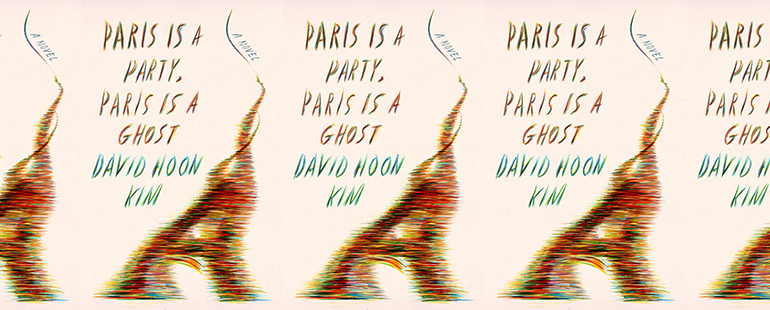“Paris, in its own way, is a character in the book”: An Interview with David Hoon Kim

In David Hoon Kim’s debut, Paris Is a Party, Paris Is a Ghost, out this week, protagonist Henrik Blatand inhabits a world of anxieties; he’s never quite sure where to go or what to do. In his work as an aspiring translator, he’s perpetually worried about which word to use, how to balance the idiomatic with technical accuracies, and even with his girlfriend, Fumiko, he’s concerned he isn’t doing the right things, isn’t good enough for her. The pair meets as students at the École des beaux-arts, him a Japanese adoptee raised in Denmark, and her from a small Japanese town, and when Fumiko locks herself in her Paris dorm room, Blatand doesn’t know whether to call the authorities, break down the door, or simply let her have this moment: “No amount of pleading or bargaining seemed to sway her resolve not to come out. We hadn’t argued. One minute she was sitting on my bed; the next minute she wasn’t.” When she speaks to him from behind the closed door, her words (and their worlds) scramble: “Then I heard her say ‘J’ai froid’ – ‘I’m cold.’ Or it could have been ‘Ta voix – ‘Your voice.’ The fact that so many French words rhymed with each other, coupled with Fumiko’s difficulties in pronouncing them, resulted in frequent misunderstandings between us.”
Despite Blatand’s active worry—he proffers food and conversation through the door—Fumiko dies a month later of malnutrition. Blatand arrives one day to find emergency vehicles surrounding the dormitory, and he knows what has happened before he goes up in the elevator, as he looks up at her window from the parking lot: “I finally understood what Fumiko had been trying to tell me in her garbled, mispronounced French: not Ta voix but Au revoir. Gazing up at the rows of windows, I saw the white bedsheets and Fumiko’s silhouette. The illusion held for another second, and then it was gone.” Blatand, with this loss, becomes adrift in the cityscape of Paris, awash in her memory.
Hoping to force himself onward through the grief, Blatand abandons his thesis on Samuel Beckett and instead becomes a student at the school for translators and interpreters, believing it might be a way to disconnect from the proximity of Fumiko’s residence, and the constant reminders of her. Meeting new people and building new relationships, Blatand hovers between French and English on the page and between purpose and comprehension in his own existence. Japanese by birth and adopted by a Danish couple, Blatand began his life on the cusp of two cultures, and as he earnestly studies translation, he begins to realize the true scope of that tenuous territory between languages and cultures, how we interpret and translate those around us, and how the ghost of others can linger beyond our comprehension.
As Blatand eases into these perceptions, his time in Paris and the city itself begin to parallel his thoughts and feelings, adding another layer of intent and interpretation, another way in which the world is translated around him. When Fumiko’s body is dissected by medical students, Blatant reaches into his own depths, exploring his emotions. And when he and some of his fellow translation colleagues tour the city’s catacombs, Blatand becomes lost in the physical spaces just as he feels lost in his life, not sure if his visions of Fumiko will ever go away—or if he even wants them to. In this way, Paris mirrors Blatand’s experience of a shattered life and underscores how difficult it can be to interpret, translate, and contextualize our surroundings and the people in them, especially in the wake of loss.
Paris Is a Party, Paris Is a Ghost is as much about Blatand and the characters around him as it is about the city itself, as much about the narrative momentum created through his wanderings as it is about the languages that carry and charge through him. Kim, a Korean-born American educated in France, has created a novel that captures the experience of knowing another language, another culture, and yet still feeling at bay from it—of finding oneself mired in loss and grief, in belonging and not, attenuated to the struggle and attuned to ghosts who refuse to be done with us.
J. A. Tyler: You write in both English and French. In which language was Paris Is a Party, Paris Is a Ghost originally written?
David Hoon Kim: I wrote it in English, though it’s true that I often asked myself, How would I say this in French? which perhaps isn’t all that surprising given that the reality of the book is a French-speaking one. As a result, I was very conscious of writing this book in English, precisely because everything described in it is French. There was always something logistical to figure out, like when to translate and when to let the context speak for itself, or the best way to capitalize the proper names (French and English have very different rules). Do I try to explain that a “kebab” is not the same thing in France and in the U.S., or that Amélie Nothomb, virtually unknown here, is a huge celebrity in France? From the start, it felt more like I was translating a book than writing it. Working on this book made me realize—or perhaps I should say reminded me—how tricky it can be to describe another linguistic reality without writing in that language.
JAT: Does one language feel more like “home” than the other?
DHK: It’s funny that you should use the word “home”—to my mind a quintessentially English word that can mean both a physical dwelling and the place where one is from. In a way, it seems appropriate that an equivalent doesn’t exist in French, a language that I didn’t grow up speaking. And yet I can’t help but feel its presence when I write in English, whereas in French I don’t feel a similar need to pass through English, strangely enough.
JAT: Samuel Beckett, who is referenced in the novel, wrote in both English and French too, and fellow playwright Eugène Ionesco is also mentioned in the book. What is the novel’s relationship to these writers and their Absurdist genre?
DHK: Yes, there is the postcard of Beckett that Blatand, my protagonist, has pinned to the wall of his residence hall room, and the thesis on Beckett that he abandoned. But I also like to think, however modestly, that the Franco-Irish writer is present in the language of the text itself. That said, I am more partial to his novels than to his plays, though there are moments in the book that I suppose could be qualified as being absurd. (In passing, I think that it’s interesting that one of the categories my book is listed under on Amazon is “Absurdist Fiction.”) As for Ionesco, I’ve read his better-known plays, as well as the sole novel that he wrote—which almost reads like a play—but I don’t feel a particular affinity for his works, which play around with language, and even question language, but never seem to step outside of language, the way a writer like Beckett or Nabokov does.
JAT: How do you see Beckett and Nabokov achieving this stepping outside of language?
DHK: Both achieve it in the way of other multilingual writers: through wordplay that draws from the vocabulary and syntax of another language. In that sense, it’s nothing revolutionary. One might say that more than what a writer like Nabokov does, it’s the extent to which he does it that is worthy of note, in my opinion. His writings are filled with echoes of words and images taken from his two other languages. Alas, not knowing Russian, it’s his Gallicisms (or French-isms) that I am sensitive to in his works. It was one of the things that struck me when I read Lolita, for example. I remember at one point he describes people leaning forward “like towers of Pisa,” which is a relatively common expression in French used to describe something balanced precariously or lopsidedly. And words like “inutile” and “fatidic,” though attested by Webster’s International Dictionary (which Nabokov liked to consult), are far more common and banal in French. Beckett plays similar games. In his last English-language novel, Watt, he uses the verb “support” in the French sense of “withstand, tolerate.” There are other, more interesting examples from both writers, no doubt, but those are the ones that come to mind at the moment.
JAT: Your novel has a strong focus on language and translation, on how words and phrases can be molded and shaped to fit the moment. Does this mirror how the characters themselves are interpreted—translated, and sometimes mistranslated, by those around them?
DHK: I think so—maybe? You could argue that Blatand (who was born in Japan but adopted by a Danish couple and raised in Denmark) doesn’t really understand Fumiko, the Japanese girl he falls in love with at the start of the book. To an extent, he sees what he wants to see in her, and it’s possible that she, too, sees what she wants to see in him. The mistranslations occur in more than one direction. He’s her first European Asian [partner], just as she’s the first girl from Japan that he’s ever gotten to know. In retrospect, I think it’s why—or partly why—I made him Danish (and not, for example, Asian American), so that meeting someone like Fumiko could be a sort of turning point, something that changes the way he sees the world and himself. More generally, I wanted to explore what it’s like to be a visible minority, an Asian, a Westernized Asian, in a slightly different context, but also a context that felt closer to my own experience as the product of three cultures and languages, which I hadn’t often seen in American and Asian American literature.
JAT: These dichotomies or splits, in language, in culture, and in representation, are mirrored in the novel’s play with “magic” versus reality. Fumiko in particular is a character who both exists and doesn’t. Would you consider the novel magical realism, if absurdist fiction doesn’t ring quite true? Or how in your mind is the book best classified?
DHK: Perhaps as a book about a city? I like to think that Paris, in its own way, is a character in the book, a character, to borrow your turn of phrase, who both exists and doesn’t exist. It’s a phantomatic Paris, a memory palace filled with ghosts, not just of Fumiko but of all those who once lived there and have since disappeared. At one point, Maryvonne, Henrik Blatand’s classmate at the translation school, says that the city is full of ghosts. She could mean ghosts in the literal sense or people who are simply no longer there. At the same time, it’s not a tourist guide either; I wasn’t interested in recreating the city in minute and painstaking detail—the way it might be in a historical novel, for example. The city is most present, I think, in those moments when my protagonist is out and about, browsing through the used book bins in front of Gibert Joseph or walking past an empty Chinese restaurant, when he notices the lights of a kebab joint at night or the long RER tunnels whose underground corridors are perpetually under construction. [It’s] a portrait of Paris as a sort of purgatory, if you will.
JAT: Some moments in the novel also reflect this web between people. The cadaver dissection runs parallel to a deeper dive into the characters, and the catacombs echo the characters’ feelings of being overwhelmed or lost. When you first start a draft, are you more intent on the internal drive of the characters, or the external creation of setting and action?
DHK: That’s an interesting observation. I think the latter more than the former? Internal drive, in my mind, suggests a chronology, something I’ve always had trouble with in my writing. The structure of the book, which could be called episodic, wasn’t entirely intentional. To say it more prosaically, I started out writing what I thought were interlinked stories told from the perspective of a small cast of characters, only to find myself writing from only one point of view, that of my Danish protagonist. “Is it still you?” the book’s third chapter, is the last thing I wrote, like the last piece of a puzzle, perhaps. Then I spent some time moving things around. On some level, I wanted something that could be read as both a novel of sorts and a series of linked stories. How well I succeeded in this, of course, is not for me to say. As we all know, one never writes the book one set out to write.
JAT: What are you at work on now? Are there upcoming projects you can give us a hint about?
DHK: Like many authors, I am hesitant to talk about works in progress, though I will say that it will take place in Paris, because it’s the only place I can really write about, that I feel compelled to write about. There might be an exception somewhere—and of course, a part of my novel takes place in Rome—but in general I have never really written fiction about any other place than Paris. I might even go so far as to say that, for me, writing fiction means writing about Paris.
This piece was originally published on August 4, 2021.


